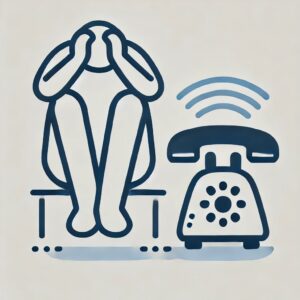 What Happens if the CFPB Closes? How It Could Impact Creditor Harassment
What Happens if the CFPB Closes? How It Could Impact Creditor Harassment
What happens if the Consumer Financial Protection Bureau (CFPB) shuts down? Here’s what you need to know about the CFPB and creditor harassment.
The Power of the CFPB and What’s Next
For years, the Consumer Financial Protection Bureau (CFPB) has acted as a watchdog against abusive debt collection practices. It has fined shady lenders, cracked down on illegal creditor harassment, and given consumers a place to report bad actors. But if the CFPB shuts down or loses its power, what happens next?
As a bankruptcy lawyer, I already help clients escape creditor harassment. And without the CFPB, the responsibility to hold debt collectors accountable could shift even more onto bankruptcy attorneys like myself.
The Primary Law About Creditor Harassment: The FDCPA
The Fair Debt Collection Practices Act (FDCPA) is a federal law designed to protect consumers from abusive, deceptive, and unfair debt collection practices. It regulates how debt collectors can contact you.
Specifically, the FDCPA prohibits harassment, threats, excessive calls, and misleading statements about your debt. Under the FDCPA, collectors cannot:
- Call before 8 AM or after 9 PM
- Contact you at work if you’ve asked them not to, or
- Falsely claim they can have you arrested.
It also gives you the right to request written verification of a debt and dispute any inaccuracies.
If a debt collector violates the law, you can report them to the Consumer Financial Protection Bureau (CFPB) or take legal action to hold them accountable.
 How the CFPB Protects You from Creditor Harassment
How the CFPB Protects You from Creditor Harassment
The CFPB was created in addition to the FDCPA to protect consumers from unfair, deceptive, and abusive financial practices. When it comes to debt collection, the CFPB:
- Investigates and fines companies that harass borrowers.
- Enforces the FDCPA to prevent aggressive collection tactics.
- Gives consumers a place to report illegal debt collection practices.
- Provides educational resources so you know your rights.
In short, the CFPB has been a major reason why debt collectors think twice before crossing the line.
What Happens if the CFPB Closes?
Without the CFPB, creditors and debt collectors could face less oversight, although they’d still be bound to certain laws.
Here’s what could change:
More Aggressive Collection Tactics
With fewer consequences, debt collectors may ramp up harassment. You could see more late-night calls, threats, and intimidation tactics.
 Harder to Hold Creditors Accountable
Harder to Hold Creditors Accountable
Right now, you can file a complaint with the CFPB, and they can potentially take legal action. Without it, you may have to fight bad actors on your own or hire a lawyer to take them to court.
Increased Debt Collection Scams
The CFPB helps expose scam debt collectors. If it disappears, fake debt collection schemes may become more common, preying on people who are already struggling.
Weaker Consumer Protection Laws
Without a strong regulatory body, lenders and collectors may push for looser rules, making it even harder to challenge harassment.
There’s no guarantee of exactly what would happen without the CFPB, but there’s no doubt it’s an incredibly powerful tool in fighting creditor harassment.
However, the FDCPA would still hold true – and that means you’re still protected by the law against all sorts of creditor harassment. You just need someone who will fight for you.
The Pressure Falls on Bankruptcy Attorneys
If the CFPB is no longer around to police bad debt collection practices, bankruptcy attorneys will be one of the last lines of defense.
When you file for bankruptcy, an automatic stay immediately stops debt collectors from contacting you. Without the CFPB, this automatic stay may become one of the few guaranteed protections against harassment.
A good bankruptcy attorney may also be able to help you fight back against creditors who violate the FDCPA.
And in addition, they can help you understand what’s legal and what isn’t.
 What You Can Do to Protect Yourself
What You Can Do to Protect Yourself
If the CFPB shuts down or loses power, here’s how you can protect yourself from creditor harassment:
✅ Know Your Rights
Even without the CFPB, the FDCPA is still law. Debt collectors cannot threaten you, call you at odd hours, or mislead you.
✅ Keep Records
Save voicemails, emails, and letters from debt collectors. If they cross the line, this evidence can help a lawyer take action.
✅ Send a Cease and Desist Letter
You can legally request debt collectors stop contacting you. If they don’t, they may be violating federal law.
✅ Consider Bankruptcy
Bankruptcy can wipe out debt and stop collectors in their tracks. It may be the best solution if harassment is constant and unmanageable.
In addition, bankruptcy has the power to stop foreclosure and repossession, end wage garnishment, and clear your credit card and medical debt. It helps you get a fresh start and rebuild your finances from a healthy place.
 A Bankruptcy Lawyer to Help You with Creditor Harassment
A Bankruptcy Lawyer to Help You with Creditor Harassment
For years, the CFPB has fought creditor harassment. But if the CFPB closes, it will be up to bankruptcy attorneys to help you fight back.
Without strong oversight, debt collectors could become bolder, push the legal limits, and try to pressure people into payments they can’t afford.
Fortunately, you don’t have to go through this alone.
For decades, our experienced Memphis bankruptcy attorneys have helped thousands of people stop creditor harassment and get out of debt for good. We know exactly how these debt collection companies work, and we tackle them head-on. We use the power of the courts and the legal system to protect you and help you get back on your feet.
If you’re dealing with creditors harassing you and making your life difficult, talk with someone who can put a stop to it.
We offer a free consultation to help you figure out your best options. To get started, just contact us online today or call us at 901-327-2100.
